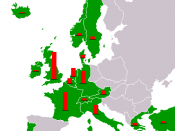The Policy of Containment
Americans believe that if Franklin D. Roosevelt would have lived longer, that he would have been able to stem the tide of tensions between the Soviet Union and the United States. His successor lacked greatly the Talent of FDR. The new president, who was more comfortable with machine politicians than with polished New Dealers, liked to talk tough and act defiantly. Truman complained that the U.S. Negotiations had been a "one way street" just ten days after he took office. He then vowed to not "baby" the Soviet no longer.
A crisis in the Mediterranean prompted President Truman to show his colors. On February 21, 1947, amid a civil war in Greece, Great Britain informed the U.S. State Department that it could no longer afford to prop up the anti-Communist government there and announced it's intention to withdraw all aid. Truman concluded, Greece, Turkey, and perhaps the entire oil-rich Middle East would fall under Soviet control, without U.S.
Intervention.
On March 12, 1947, the President made his argument before Congress in bold terms: "At the present moment in world history, nearly every nation must choose between alternative ways of life... One way of life is based upon the will of the majority, and is distinguished be free institutions...and freedom from political oppression. The second way of life is based upon the will of a minority forcibly imposed on the majority... And the suppression of personal freedoms." Never mentioning the Soviet Union by name, he appealed for all-out resistance to a "certain ideology" wherever it appeared in the world. The preservation of peace and the freedom of all Americans depended, the president insisted, on containing communism.
Congress approved a $400 million appropriation in aid for Greece and Turkey, which helped the monarchy and right-wing military crush the...


